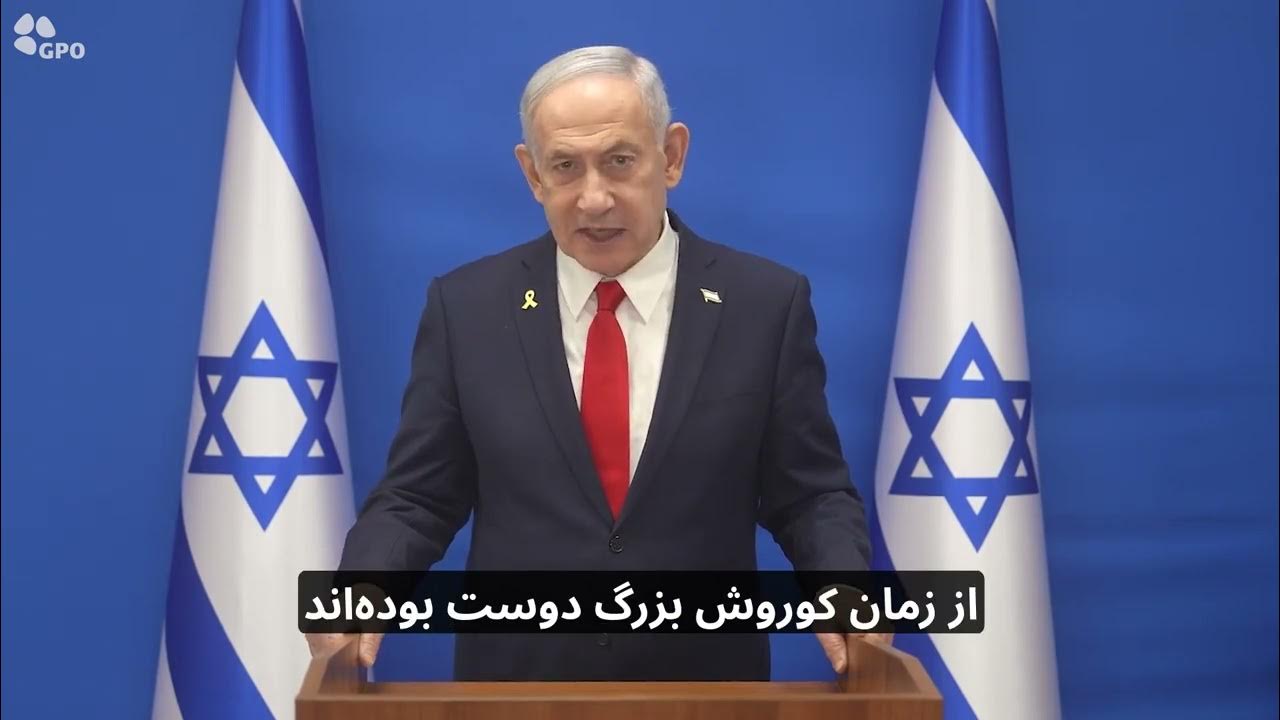JUST IN: Israel's Netanyahu Addresses Iranian People In Social Media Post Amidst Rising Tensions
Summary
TLDRIn this speech, the speaker addresses the people of Iran, criticizing their regime for subjugating them while funding wars and nuclear programs at the expense of their well-being. The speaker emphasizes how the Iranian government cares little for its citizens, imagining a future where resources are redirected to education, healthcare, and infrastructure. They express hope for peace between Israel and Iran once the oppressive regime falls, encouraging the Iranian people to aspire for a better future, free from poverty, repression, and war. Israel stands with the Iranian people in their pursuit of peace and prosperity.
Takeaways
- 🗣️ The speaker addresses the people of Iran directly, bypassing intermediaries and filters.
- 🔥 The regime in Iran is accused of subjugating its people while making speeches about defending Lebanon and Gaza.
- ⚔️ The regime is claimed to be deepening regional conflict and war with every passing day.
- 🎯 Israel claims there is nowhere in the Middle East it cannot reach to protect its people and country.
- ⚖️ The Iranian regime is said to care more about foreign wars than the well-being of its own citizens.
- 💰 Billions spent on nuclear weapons and wars could have been invested in education, healthcare, and infrastructure in Iran.
- 🌅 The speaker envisions a future where Iran is free, prosperous, and at peace with Israel.
- 🚫 The current Iranian regime is accused of supporting terrorism globally and repressing its own people.
- 🌍 The people of Iran are portrayed as deserving a better future, free from poverty, repression, and war.
- 🤝 Israel expresses solidarity with the Iranian people and hopes for a peaceful, prosperous future for both nations.
Q & A
What is the main message of the speaker to the people of Iran?
-The speaker's main message is to address the people of Iran directly, expressing support and solidarity with them against the Iranian regime, which the speaker claims oppresses its own citizens and wastes resources on foreign wars and nuclear ambitions.
How does the speaker view the Iranian regime's involvement in foreign conflicts?
-The speaker views the Iranian regime's involvement in foreign conflicts, such as those in Lebanon and Gaza, as detrimental, stating that these actions plunge the region deeper into darkness and war, while neglecting the needs of the Iranian people.
What does the speaker suggest the Iranian regime should prioritize instead of foreign wars?
-The speaker suggests that instead of wasting billions on foreign wars and nuclear weapons, the Iranian regime should invest in improving the lives of its citizens by focusing on education, healthcare, and infrastructure.
What vision does the speaker have for the future of Iran if the regime is overthrown?
-The speaker envisions a future where Iran is free from the current regime, with peace between Iran and Israel, and where Iran thrives economically through global investment, tourism, and technological innovation, benefiting from the talents of its people.
What is the speaker's view on the relationship between the Jewish and Persian peoples?
-The speaker believes that the Jewish and Persian peoples have an ancient history and that they will eventually be at peace once the Iranian regime is overthrown.
What does the speaker predict will happen to the Iranian regime’s terror network?
-The speaker predicts that the terror network built by the Iranian regime across five continents will be dismantled and bankrupt once the regime falls.
How does the speaker characterize the current state of Iran under the regime?
-The speaker characterizes Iran as being in a state of poverty, repression, and war, caused by a small group of fanatic theocrats who rule the country.
What is the speaker's opinion on the Iranian people’s stance towards Hamas and Hezbollah?
-The speaker suggests that the majority of Iranian people do not support the actions of Hamas and Hezbollah, but that their leaders do, which contributes to the regime’s oppressive behavior.
What does the speaker imply about the timeline for change in Iran?
-The speaker implies that the moment of change in Iran, where the regime is overthrown, will come sooner than many people think.
What does the speaker hope for the future relationship between Israel and Iran?
-The speaker hopes for a future where Israel and Iran are at peace, and where the people of both nations can live in prosperity and cooperation.
Outlines

此内容仅限付费用户访问。 请升级后访问。
立即升级Mindmap

此内容仅限付费用户访问。 请升级后访问。
立即升级Keywords

此内容仅限付费用户访问。 请升级后访问。
立即升级Highlights

此内容仅限付费用户访问。 请升级后访问。
立即升级Transcripts

此内容仅限付费用户访问。 请升级后访问。
立即升级浏览更多相关视频

نخستوزیر بنیامین نتانیاهو با مردم ایران صحبت میکند

Qiroatul Akhbar Gradasi 2025_ Naila Dzikratunnisa Pangestu_ UIN Jakarta

Amanpour asks Iranian official how they will respond if US strikes nuclear facilities

Prime Minister Benjamin Netayahu's Message to the Iranian People

IT’S BEGINNING! | “Be Ready To FIGHT Russia!” Countries To Bring Back CONSCRIPTION! - #294 PREVIEW

What Everyone is Missing About Iran Giving up Their Nuclear Program!
5.0 / 5 (0 votes)
